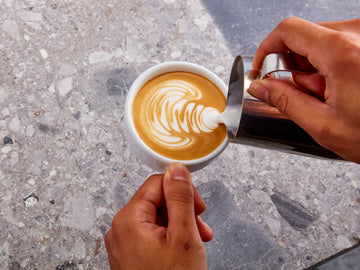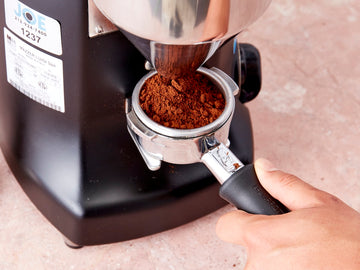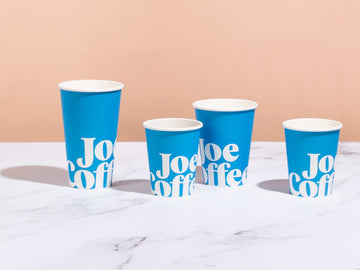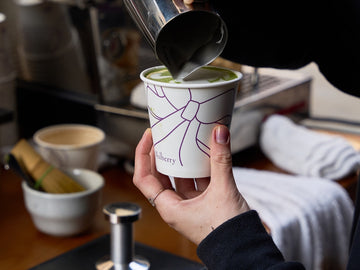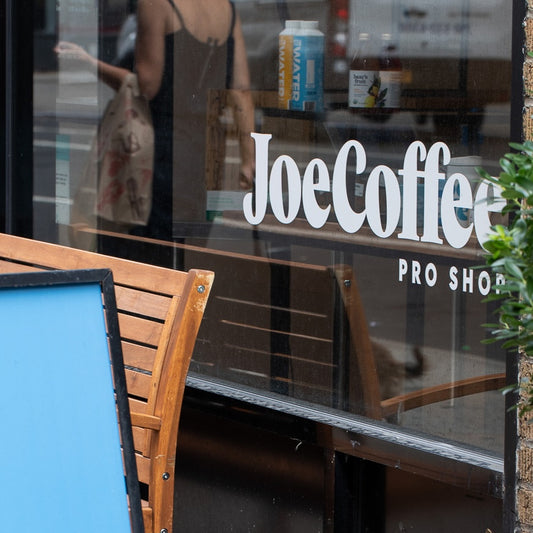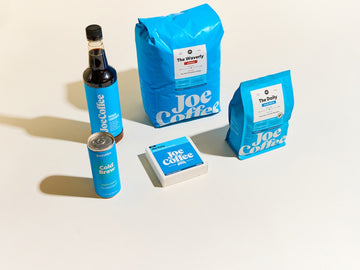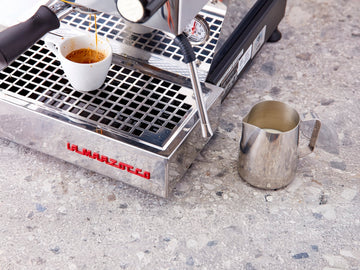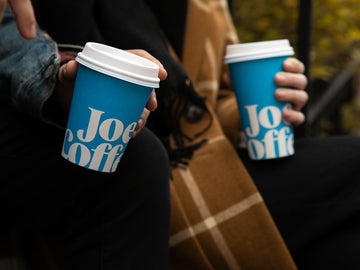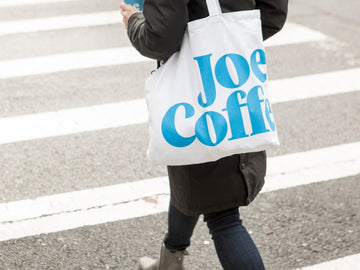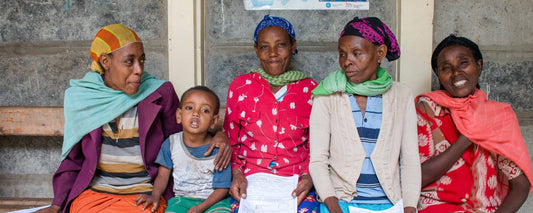women in coffee
Categories
All articles
Women in Coffee: Interview with Jeanine Niyonzima-Aroian
As we celebrate Women's History Month, we reflect on the many incredible women we work with throughout the supply stream—from strong leaders within our team to our wonderful partners whose work continually inspires us. One such partner we're proud to work with is Jeanine Niyonzima-Aroian, owner of JNP Coffee, an importing company focusing on promoting and trading African specialty coffee.We first met Jeanine at the New York Coffee Festival in October 2019 and her work in gender equity in Burundi resounded with us deeply. Soon after, we released a coffee from JNP Coffee to our Atlas Collection, a special line of coffees which aims to highlight each of our sourcing values. This coffee, from the Karehe Washing Station, was chosen to represent our sourcing value of ethics for the many ways it spoke to Jeanine's work to uplift and empower the communities where she works in Burundi. A year later, we're excited to welcome another coffee through JNP, Turihamwe IWCA, to our Atlas Collection later this month.In anticipation of this upcoming release and in celebration of Women's History Month, we present this interview with Jeanine. Hi Jeanine! Thank you so much for speaking with us. Can you introduce yourself?My name is Jeanine Niyonzima-Aroian, owner of JNP Coffee and founder of Burundi Friends International.After a 20-year career in international business, what led you back to Burundi, and ultimately into the coffee industry?Initially, what led me back to Burundi was a calling to give my people a helping hand. I was one of the fortunate ones who left the country to secure a higher education and was blessed with a great career. Burundi is one of the poorest countries on the planet. I knew I needed to do something. Through the non-profit, Burundi Friends International (BFI) that I founded in 2008 while living and working in California, we were able to empower women, youth and families to build self-sustaining communities. What started with teaching English Communications classes for youth that didn’t have the money to attend college has grown to serve more than 75,000 students across all provinces in Burundi. They have six container-libraries, dozens of smaller libraries (mostly in schools) and 1,000 English Clubs, plus full college scholarships for more than 40 students in Burundi.Like many, I stumbled into coffee by accident. On my trip to Burundi with the BFI board in 2010, I met the head of USAID who insisted that I consider the coffee industry. Later on, I ran into my cousin who was in coffee. He had just built a wet mill and asked me to help him. Then women farmers and members of IWCA Burundi, who had received goats through a BFI project, approached me to buy and market their coffee. Before too long, I found myself as a shareholder in several wet mills in Burundi. I took the opportunity to promote quality coffee with high premiums (a second payment to farmers), then collaborated with NGOs like PCI Global and BFI to bring financial literacy to farmers. Each step brought another element of sustainability to the model we established.Growing up in Burundi, was coffee always part of your life?Not at all. Tea is the culture. Coffee is a cash crop for farmers in Burundi. Most of them can’t actually afford a cup of coffee!What is JNP Coffee’s mission? Do you work exclusively with the IWCA (International Women's Coffee Alliance) chapter in Burundi?JNP Coffee’s mission is to use coffee to alleviate poverty in Burundi, to share Burundi’s exceptionally delicious coffee with the world, to educate and empower farmers, and to build sustainable communities through coffee. And no, we don’t work exclusively with the IWCA Burundi Chapter, although in 2018, JNP Coffee underwrote 100% of their production. Some of our current successful programs, like that of “Turihamwe Turashobora” coffees were with the farmers who were founding members of the IWCA Burundi Chapter.[caption id="attachment_46985" align="aligncenter" width="1280"] The women of Turihamwe take time to dance together in celebration of the joy and community that they feel.[/caption] What are some of the biggest challenges that women in coffee face in Burundi?Lack of access to land ownership, lack of education, and lack of opportunities in general.JNP Coffee is known for enabling gender-sensitive development strategies at origin. What does this mean?Through my mother, I learned quickly at an early age that if you empower a woman, you have a chance to improve the future of a family. When you empower a woman in a place like Burundi, you ensure that funds will go to feed the children and take care of the needs in the home. Women will share their knowledge with other women to improve the community’s quality of life. In our women’s savings and microlending program with BFI, the repayment rate is almost 100%. I can go on and on. Even in large US corporations, those with women in leadership perform better than their counterparts.How do you think supporting gender equity impacts the sustainability of the industry?I don’t see any other way. In places like Burundi, women are the ones working the land, taking care of the coffee trees among other crops. If we want to sustain the coffee industry, we need to emphasize quality, pay good money for it, and bring in other programs to allow farmers to diversify their crops and income, in addition to education. Also, in places like Burundi, contrary to countries like Brazil, the harvest is small and with the right support, the opportunity to produce mostly specialty grade-coffee every year is very attainable.JNP Coffee emphasizes the power and importance of partnership to support inclusive economic growth. Can you tell us a little bit about your work to promote financial literacy among women coffee growers?Education is critically important to economic development yet significantly lacking in Africa. In Burundi, less than 2% of the population has access to higher education. For most people, it’s not a lack of willingness or capability, but a lack of opportunity. I use every opportunity I have to bring education home, at origin. Through BFI, in collaboration with PCI Global, we have been able to bring a very impactful financial literacy program to women farmers, now expanded to youth in Burundi. The program provides a space where women can meet to learn about leadership, and a platform for saving and lending to each other. Some of the women farmers in the program pooled their resources and went on to start their own wet mill in 2019. They are now producing an exceptional coffee, like Turihamwe. To me, that is a good example of an inclusive economy, where women coffee farmers can build and own their own wet mill.How do you measure the impact of implementing equitable practices at origin? Is this something you’ve found challenging? We measure the impact of implementing equitable practices at origin through the example of the women of Turihamwe Turashobora group. By providing access to education, financial resources and leadership, women farmers could build and manage their own wet mill, and the cup quality also speaks for itself. It’s been very challenging in a place like Burundi, where women traditionally don’t have a voice. I struggle with it myself throughout the supply chain, but it does not stop me from persisting. It is a must in Burundi, where women are an untapped resource with tremendous potential.[caption id="attachment_37041" align="aligncenter" width="1280"] Jeanine inspecting drying beds at the Karehe Washing Station[/caption] Can you tell us about your experience as a Black woman in specialty coffee? How does it compare to your experience as a Black woman working with producers in Burundi?I love being a Black woman in coffee. This is where I belong. I can represent my fellow women farmers in Burundi right here in the consuming country. However, this does not make it any easier doing business as a Black woman in America. I face the same discrimination as any other Black person in the US, but when I go home to Burundi, the farmers of Burundi are my people and I owe them everything to represent them well. That said, I still face the same gender prejudice and inequality as a businesswoman in Africa. However, I view it as an opportunity to be a role model for other women in Africa, America and the world.What can you tell us about our upcoming release, Turihamwe IWCA, and the women who produced this coffee?Turihamwe coffee is a perfect example of an important story. Women farmers who were IWCA members got together, saved their money as they learned to do in our financial literacy program, and then built and started their own wet mill operation in 2019. Now they are producing a coffee that is outperforming many others. That’s why in Kirundi, its name means “together.” Indeed, together, we can succeed and make a difference. Thank you for allowing us this opportunity. All photos courtesy of JNP Coffee
Celebrating 1 Year of the Women in Coffee Project
Joe Coffee's Director of Roasting, Amaris Gutierrez-Ray, is the founder of the Women in Coffee Project (WICP). Amaris has worked in coffee for more than a decade—from barista to retail manager to production to her job today at Joe, managing the roasting department as well as sourcing green coffee. Along the way, she found herself asking questions. Questions like: why do women do so much behind the scenes in coffee, particularly at origin, but their voices aren't heard? In what ways can we share their truth with others throughout the community? How can we celebrate them and elevate their experience? We spoke with Amaris at Year One of the WICP to discuss the path this journey has taken so far.Congratulations on 1 year of the Women in Coffee Project! For those who aren't already familiar, can you tell us what the Women in Coffee Project is, and describe your mission?
Thank you! I have been thinking we need to have a birthday party or something to celebrate. We started in October of 2018, so we are a little overdue!
The Women in Coffee Project is a platform for women in different roles in coffee-producing countries to share their stories and their perspectives. The world of coffee is as complex as it is diverse, and without context, it’s difficult to learn about, or even measure, gender equity from country to country. [caption id="attachment_30311" align="alignnone" width="2560"] Gender in Coffee Documentary Screening in Baltimore[/caption]What inspired you to start the Women in Coffee Project?
When I started the WICP, I was impressed by the fact that women make up about 75% of the workforce in coffee, and are often in roles that directly relate to quality in the early stages of a coffee supply stream (hand-harvesting, processing, fermentation). The specialty coffee industry is really concerned with quality and consistency, and yet I was surprised to learn the voices of women are not the majority heard.
I started searching the internet for more information about gender equity, and also quickly realized that research and measurements differ depending on who is reporting the data. And, on top of that, there’s a lot that is difficult to measure in the first place. For example, a common obstacle for female producers to access training or workshops in their regions is a lack of transportation and/or childcare. In order to accurately report whether a training session has been successful in reaching women in that community, one also needs to measure if they are providing those things so that women can actually attend. The context there is key. That’s the difference between equity and equality: moving toward a more equitable future means we are observing the differences between us and accounting for them.
Our mission is to do just that. We also hope for information to go back and forth between consuming and producing countries. We have great technology on our side! We primarily use Instagram as a means to communicate and take a peek into each other’s lives. We do full-length interviews with women in different roles, and then publish them online and give them the space to do an Instagram Takeover and share what a day or a week in their life looks like.
In what ways do you work to facilitate dialogue and provide an empowering platform for women in the coffee industry?
There is a lot of demand right now for transparency in coffee from the consuming side, which is a truly wonderful thing, but I think consuming countries also need to be open to questions asked of us. We see a need for a space to engage outside of preexisting business relationships. We advocate for awareness, and that means encouraging each other to be aware of any subconscious power dynamics inherent to roles between first- and third-world countries. Simply being aware is often the key to learning how to act with sincere professional respect.
That’s why the other key component of our vision is to invite four or five women (in groups of 2, for community and support) each year here to NYC for a panel event and visit. Their stay gives us more time to listen to each other, ask questions, taste coffee together, and learn from each other. Throughout the year we fund raise to be able to cover all transportation and lodging costs for our invited guests. We also host events to support organizations that are engaged with supporting women in coffee-growing regions (in the past we have hosted fundraisers for Grounds for Health, the Partnership for Gender Equity, and the International Women’s Coffee Alliance). [caption id="attachment_30308" align="alignnone" width="1024"] First Annual Women in Coffee Panel Event, April 2019[/caption]
Has the WICP and its goals evolved at all since its inception? If so, how?
We have definitely evolved. I think when we started I envisioned us hosting panel events every quarter, but I was quickly humbled to learn we need to work around a producing woman’s schedule, and not my own! Every country has its own harvest schedule, so I had to be open to the dates that worked for the women I was inviting. In the same way, truly listening (as an active verb) takes time! Interviews take time, especially when we are primarily connecting over the internet and speaking during a harvest season. It’s humbling when someone makes time to answer questions for an interview for this project, so I try to honor that time by being as intentional as possible.
We also have become more of a resource. Different companies have asked how they can get more involved in gender equity, and support women in coffee. Since we don’t provide market access to female producers ourselves, we share lists of coffees from different IWCA chapters or encourage roasters to consider donating portions of retail sales to organizations supporting women in coffee. [caption id="attachment_30339" align="alignnone" width="750"] 2019 Women's History Month Cupping series[/caption]What kinds of projects or programming did you take on last year?
Last year we hosted a month-long cupping series for Women’s History Month. We invited different roasting and importing companies to highlight the female producers in their supply streams, and opened the tastings to the public. It was so great to see the energy and enthusiasm that other companies have for supporting gender equity and celebrating coffees produced by women. It brought different communities here in NYC together and was a great way to learn more about how gender equity is expressed differently. Having access to someone from an importing company for an evening to ask questions was radical, and I noticed it sparked a lot of enthusiasm for folks from roles in retail spaces, who don’t often have the opportunity to engage with this side of coffee.
We also collaborated with Fincas Mierisch in Nicaragua to make WICP tote bags! It came out of a conversation with the panelists from Nicaragua last year, about how off-season work is hard to find. A project like this allowed us to pay a fair wage for the materials and labor to make the tote bags, allow for a little more job stability for a group of women outside of harvest time, and incorporate local jute and the screen printing press they use to print coffee sacks. The women collaborated with a local dressmaker to put them all together and add in colorful straps. Each tote can hold up to 12 pounds of green coffee ;) And it gave us a product we could use for our own fundraising efforts. We’re definitely going to try to do this again in 2020! [caption id="attachment_30309" align="alignnone" width="1280"] Screen printing Women in Coffee tote bags[/caption]Q: Starting the WICP was an ambitious undertaking with your workload as our Director of Roasting. What were some of the biggest things you learned in the process?
Wow, so much! (I’d be lying if I said I had time management figured out. It’s a process!) My day job overlaps with some of my goals for the WICP. Learning how to listen, how honesty and compassion are two sides of a coin and both should be inextricable from respect, the vulnerability of being grateful and sincerely generous -- these will always require practice. The WICP has given me a lot of practice, and it’s benefitted my Joe role in ways even I probably can’t imagine.
To be candid for a second, it’s not part of my personality to be overly emotional or even understand emotions very well, but through this project, I’ve been exposed to many different, passionate women all over the world. Speaking with them has fired me up, given me access to myself in some ways, and has also incubated a deep appreciation for the emotions we all share. It’s a great human gift and offers us common ground. [caption id="attachment_30340" align="alignnone" width="2560"] Amaris leading a WICP Talk at the NY Coffee Festival, Oct 2019[/caption]Q: You've had the unique opportunity to have conversations with many women. Can you share one of the most interesting conversations you've had?
For last year’s panel event, my Nicaraguan mom surprised me by showing up for it. She came the day before the event, and I had planned to have dinner that night with coworker Kendra Sledzinksi and our invited panelists (Eleane Mierisch, Haisell Beteta, Dulce Barrera, and Melanie Herrera). The women we invited for that panel, our first event, were all native Spanish-speakers, like my mom, and from Nicaragua and Guatemala. So my mom came with me to dinner, and while we were heading over there, I remembered in each of the interviews with the panelists beforehand, they had responded “my mom” to the question “Who inspires you the most?”
Being able to introduce my mom, one of the original strong women in my own personal experience, to these women I had learned so much from was really moving. We had an amazing conversation that night, about Nicaragua past and present, and so many other things. Kendra made an effort to speak in Spanish, the panelists made an effort to speak in English to share the burden, and my mom was so happy. It made me grateful for my own history and all of the moments that connected us in that group. The strength of women everywhere is a truly powerful thing. [caption id="attachment_30357" align="alignnone" width="1280"] Dinner with the 2019 WICP panelists[/caption]Your Instagram bio says, "One story isn't enough to understand a person or place." Through the dialogue the WICP has opened up, what would you say are the most common themes and challenges facing women in the industry?
Like in the rest of the sector, the challenges women face are related to economic disparity, adapting agricultural practices quickly to account for climate changes, access to healthcare. I’ve also heard a lot of practical optimism. The temporal nature of coffee as an agricultural product and the unity of communities working together seems to lend itself well to looking ahead to what can be improved in the coming years.
What's on the horizon for the WICP this year?
This year we’re going to step up our communication game. I’m building a newsletter and learning how to improve our Instagram and marketing plans. We’re going to lean into our reputation for being a resource and create some documents that can be widely shared about how to get involved in the movement for gender equity. We’ll host our second annual panel event in October (panelists and date still TBD). We’ll publish even more interviews and Instagram Takeovers. We’ll take a few more steps toward our 3-year plan of attaining 501c3 non-profit status. We’ll collaborate on making some more tote bags with the community of women working for Fincas Mierisch in Nicaragua. I sense we are just hitting our stride after a period of a learning curve, and I can’t wait to see where this year takes us.
View this post on Instagram
Photo: Marianela visiting don Adrian Hernandez farm in Heredia in the Central Valley region. ?Hello again from Marianela Montero, this week’s Instagram Takeover! ?I really enjoyed tasting different coffees and learning what details are behind every cup of coffee. The relationships we build throughout the years are something I really value about coffee and my job. Coffee in general teaches you to be patient, for example think how long does it take a coffee plant to produce coffee, it can take 4 years and even more from the moment we grow it until we harvest the first cherries. I very much appreciate that Costa Rica is a very peaceful country and easy to travel and meet people compared to other origins. ?In 2018 I started together with my husband - Selva Coffee. Right now it’s just the two of us and during the harvest we get help, usually, an intern helps us, currently, this intern is a woman, her name is Maria Paula, she is the daughter of a farmer we work with, she is very passionate and loves coffee. I feel very lucky and proud to teach her the knowledge I’ve acquired during these years. I also work closely with a logistics company, they are of great support. In my country most of the people are men, but I always feel respected and appreciated by them. I’ve been working with them for four years and I cannot complain. We also work constantly with farmers, roasters, and importers; a few of them are women but mostly men. ?It is interesting to work with different cultures that have a reputation for having unequal status between women and men because in my case I feel even with these cultures having this reputation and I’m empowered and respected by them. I have to say I feel very supported and respected in general by both men and women, but there is something that makes me very excited and happy about working with women in coffee and seeing the strength we share and all the things we have accomplished in this industry. I’m the woman leader in my company :) #costarica #selvacoffee #mujereslideres #strongwomenofcoffee #womenincoffeeproject #bilingual #mujeresencafe #instagramtakeover #cafedecostarica
A post shared by Women in Coffee Project (@womenincoffeeproject) on Jan 22, 2020 at 4:27am PST
How Grounds for Health Is Working to Prevent Cervical Cancer in the Coffeelands
We're great admirers of Grounds for Health, whose mission to provide cervical cancer screening in developing countries—specifically in remote coffee-growing regions—has made a dramatic impact on women's lives. In honor of Cervical Cancer Awareness Month, we are excited to introduce you to the great work they are doing for women's reproductive health in the coffeelands.Our Director of Roasting and founder of the Women in Coffee Project, Amaris Gutierrez-Ray, had the opportunity to interview Ellen Starr MSN, WHNP, Grounds for Health's Executive Director. A Nurse Practitioner, Ellen started at the nonprofit as a clinical volunteer, while she practiced at Planned Parenthood of Northern New England. In 2018, she became Grounds for Health's Executive Director.A special thank you to Amaris and the Women in Coffee Project for allowing us to re-post this interview!But first, a short historyIn 1996, coffee executive Dan Cox and his friend the late Dr. Francis Fote were visiting coffee cooperatives in Mexico. They learned that cervical cancer rates there were some of the highest in the world. Dr. Fote, an OB/Gyn, knew quite well that cervical cancer is preventable and—when caught early—one of the most treatable forms of cancer. They took action, and Grounds for Health was born.These days, Grounds for Health focuses their work in Ethiopia and Kenya, where they reach women who live and farm in some of the world's finest, and most under-served, coffee growing regions. To date Grounds for Health programs have resulted in 114,833 women screened, 9,355 women treated, as well as providing clinical training for more than 400 healthcare providers.We are incredibly proud to support the work of Grounds for Health through our supply chain partner, Caravela Coffee. Through our purchasing, we have contributed funds which have helped train health workers and provide screenings to over 375 women in the Sidama zone of Ethiopia in the past two years (saving approximately 40 lives through early detection) and we look forward to growing this support more and more in the future.[caption id="attachment_29715" align="alignnone" width="640"] Ellen Starr (left) greeting Grounds for Health Clinical Specialist Aster Tilahun.[/caption]A: Let’s jump right in! Grounds for Health is currently operating in Ethiopia and Kenya, though in the past you all have worked in Mexico, Nicaragua, Peru, and Tanzania. What have you had to adapt to or change as you have grown? How do you manage that?
E: Grounds for Health (GfH) has been around since 1996, and over these years our approach to how we do things has evolved, in step with changes in cervical cancer prevention and the areas we serve. But our focus has always been on reaching women in very remote, coffee growing regions. There is a real commonality no matter what country we are in, to meeting the needs of women and their communities. From an equity perspective—as we all know—even in our country, women don’t all have equal access to quality health care.
Women are such key players in their families, communities, churches, and make up a large percentage of the workforce at the beginning of the coffee supply stream. They have long days! When women get sick or die, it has an outsized impact, and this is consistent everywhere. What we have found to be different, as we work in different places, is language, culture, and the support from Ministries of Health. But always the fundamental goal in any country is to reach the women at the end of the road.
A: It is hard to be a nonprofit, as the organization needs so much structural support, not just financial? I’m interested in how that changes. How big of a difference do you see in how medical communities receive and support you in different countries?
E: Very different! Our approach is to screen-and-treat for cervical pre-cancer in one visit, and we know that this works in low resourced areas. We have good relationships with Ministries of Health. A lot is culturally based and financial-based. The Ministries of Health play different roles in decision making about when and how cervical prevention training happens.
If a country is interested in what we offer, and also really wants autonomy with medical protocols, we have said absolutely yes...and then make sure the partnerships are really strong. Over the years, we have received a high level of respect for our work, and out of this respectful relationship, we have been ultimately successful introducing new technologies and approaches to women’s care.
But if they are stuck on one way of doing things—that we know will not result in an adequate number of women receiving treatment when needed—we can’t really go forward. For instance, a country might be really interested in a PAP based “western” system (that actually isn’t perfect even in a high income country). The country might be unwilling to acknowledge that Pap is not feasible without well-trained pathologists in significant numbers, and strong transportation and communication channels so women can get results and return for treatment. Without all of these elements in place the whole thing would fall apart. So this would actually require a great deal of additional investment, which they can’t do.
We are very tuned into these nuances of community readiness, and our first step is always to form strong partnerships. This is another way GfH is unique; we work within the public health system. We develop programs that can be implemented in existing models. This means we can help women out in the middle of nowhere because there is almost always some dispensary or health center out there that we can reach. And the medical teams our staff train and support are salaried by their government, so there is a stable foundation for impact.[caption id="attachment_29710" align="alignnone" width="1280"] This is a typical scene at a clinic where women are registered and waiting for their screening.[/caption]A: Was it difficult to put together the single visit approach? Was it new?
E: I’m not sure of the exact moment when the single visit approach came about, but it was a critical component of our work from the beginning. It did take some time for other health organizations to get on board. Some people were more interested in introducing new technologies; but if you don’t treat on the same day, why bother? Again, it’s often difficult for a woman to come back to receive her needed treatment, in these remote communities. It’s almost unethical to tell her she has a positive result then not be able to ensure treatment. Same-day screening and treatment are not always easy, but as long as we keep it as the highest priority when we implement programs, we can always make it happen.
The method we focus on and stand by, are our “campaign” models. Our staff set up 2-3 day campaigns, and begin by connecting with Community Health Promoters we have already trained. These dedicated people engage in community sensitization and education as well as the recruitment of women for the campaigns. Then we bring in all our equipment, set up a space with privacy walls (sometimes hung curtains) and women come in. Sometimes the coffee coops will help with outreach and transportation. We have found that women love to get away from their world for the day. Seeing images of women hanging out on the lawn with their babies while waiting for their turn is kind of wonderful. While we focus on how many women we can see (before dark) we ensure that they are getting the best female-focused care. We prioritize privacy, informed consent, and respectful care. On our best day we can see 120 women! Over three days you are seeing a lot of women in a short time.
Our women-centered models are incredibly important to our success, as long as the underpinning values are held high. But we are nimble so we can change up the model if/as needed.[caption id="attachment_29711" align="alignnone" width="1280"] An Ethiopian health center employee is explaining the screening and treating procedure. Multi-day "campaigns" are a way of reaching lots of women, and offer an immersion experience for clinicians Grounds for Health trains.[/caption]A: I’ve heard from others that a lack of child care can prohibit access to healthcare, training, etc. Do you find it is common for coops to give support for transportation? Is it part of your intentionality to bring children?
E: Training clinicians and health workers through campaigns (and ongoing clinical support) is what we do. Barriers for women to access these campaigns are many: time (away from work); childcare; family expectations; permission from their husbands (which is probably one of the hardest things for us in the US to fathom); transportation. The coop can really help with all of these. The coop can support, for instance, informational meetings with the men. Some coops only have the resources to talk us up. So, it varies. The women’s responsibilities in their communities are vast. Taking time for their own care is difficult.[caption id="attachment_29714" align="alignnone" width="1280"] Grounds for Health often sees women from multi generations, and children are welcome. GfH staff will watch young children while their mothers are being seen so women feel safe and comfortable.[/caption]A: Do you notice any psychological shifts? Sometimes women feel like they can’t take care of themselves. Health care feels like it is luxury rather than a need.
E: Women, when they come in for health care, experience a person focusing on them and their health. They learn that they are worth the effort to ensure that they don’t die from something they may have seen female relatives die from. They come in fearful. Then they walk away from their screen-and-treat feeling empowered by the opportunity to take care of themselves and being supported by their communities to do that.
A: It is harder to make those impacts visible…
E: Yes, a lot of nonprofits are interested in gender equity and empowerment, but how do you actually talk about those impacts of empowerment? It can seem “soft” and it is not especially measurable…and people like measurables, like how many women we are able to treat in a day.
A: There can be misunderstandings, even between spouses. That empowering experience can really impact misinformation.
E: We have seen some horrible things because of miscommunication or rumors. That is why we need this strong Community Health Promoters. Depending on the community, if you start with the village elders, shamans, the priest, then everyone starts to think that keeping women healthy matters. But there still will be rumors. HPV (the virus that causes cervical cancer) sounds like HIV. Our Community Health Promoters can correct misinformation in their own communities.
For instance, since I am a clinician I periodically travel from Vermont and go to the field to do some assessment, evaluation, and refresher training. Several years ago we had started a program in the foothills of a country in East Africa. The coop had identified their most respected members and we trained them specifically as CHPs. It took many hours of slow driving on poor roads to get to this really remote region. And then when I finally arrived, there were no women to be seen! The Community Health Promoter who had been assigned to help with the campaign went out to ask around. And she found out that the women thought the health provider was going to reach in, pull out the uterus, cut it out, and then push it back in. Horrifying! But you can understand where this misinformation came from. These women have never had a speculum exam, and there is something going “in and out”...but it is a probe. We tell them we have “removed” the bad cells…so the language is there, but the story being told was totally skewed. What happened next is so indicative about how we work in partnership with the community. The village priest heard about this rumor and got right on it; he spent his next sermons talking about cervical cancer. And then the women came. It was a powerful man talking positively about cervical cancer care and women’s health. We all worked together.[caption id="attachment_29717" align="alignnone" width="1280"] Coffee co-ops partner with Grounds for Health to contribute to the wellbeing of women who work in their industry. Here, they are helping to transport women to a screening. The Ethiopian women are singing as they arrive at a clinic.[/caption]A: Are you noticing other kinds of disparity when it comes to health care? What else is lacking?
E: There is a lot. We work with a specific focus, because cervical cancer is a preventable disease and also a horrible disease to die from. We aren’t distracted. What hasn’t happened, and it will take a considerable amount of time to solve for, is to reduce transportation barriers. This is connected to economic disparity and limited access to resources. In remote areas, one often needs to travel far to access treatment for cancer, and who has the money to take an airplane to get treatment? Our staff sends me images of cervixes for review, which is part of our supervision and support practices. Last week I looked at 50 images and three were frank cervical cancer, which made me want to cry. So that is why prevention, and catching this before it becomes cancer is so important! Prevention treatment can happen on site; cancer treatment is mostly unattainable for the women we see.
A: Do you have educational materials? Is there anything you can offer a woman with cancer?
E: When we work in remote communities we are sometimes talking with women who might not be literate. A big issue could be a tribal language. Sometimes our staff doesn’t know how to speak the local language. So when our staff in Ethiopia go out to talk to women, they will be challenged to get the information translated correctly; but they will! Even without language, though, we can express and communicate respect. It’s a high-stake medical situation, so we need to bring in the important element of humanism and go into a community with that fundamental attitude.
We are so respectful of women we see. When it comes to training staff, people think we are training them about how to identify cervical pre-cancer. And our response is to say we are teaching you that ... but we are also showing you how to “treat” women, how to insert a speculum so she doesn’t experience pain, and how to be respectful of her dignity and privacy. These qualities matter!
A: Without that there will never be equity. Something I have learned in gender equity—that value set has to be part of the vision, how you communicate and establish yourself. You are integrating with different types of people, and you can’t make that go away. But that respect connects it all together.
E: It has been a challenge to find women to be on our in-country staff, because women generally don’t have the same education opportunities. The young male clinicians we train might have an attitude that they are more important than the women they see. And we help change that attitude. Watching how they change and adjust is promising.
We also look at eliminating the idea that we are the “white savior from the West.” We work to show we are partners. For instance, it was really powerful when, as a white woman from the west, I stood up in a village meeting and said I have had HPV. It was so powerful for them to see and hear that; we have commonality and all are susceptible.
***Through your purchases at Joe Coffee, you help us support the good work Grounds for Health is doing for women in coffee. To donate directly, please visit the Grounds for Health donation page.
A Day in the Life | On The Family Farm with Andrea Rubí
Wonder what the average day for a coffee farmer in Honduras is? Our partner Andrea Rubí, who grew up on her family's Fincas Ruland farms and now manages their specialty farm, Finca Ruland 2, transports us to the farm to share a day with us.[caption id="attachment_19337" align="alignnone" width="1024"] Andrea pictured with her mother, Suyapa and sisters Angie and Brenda[/caption]5:00 amWhen a new coffee harvest begins at Fincas Ruland, our obligations start very early morning, since the coffee pickers begin to arrive at the farms at 6:00 am. My day begins with a good cup of coffee because the harvest in Honduras takes much of our winter; they are very cold mornings. The good thing about living on the farm is that I'm never late for work! My mother, together with my sisters, will have already distributed the work of the day, and each one knows the area to cover. Usually I take care of the coffees on Finca Ruland 2, our specialty farm.6:00 amAt this hour there is a group of coffee pickers ready to be taken to Finca Ruland 2. It takes us 30 minutes to get to Finca Ruland 2, and the weather changes completely on the way up, since we go from being 950 meters above sea level where we meet at Finca Ruland 1 to 1400 meters above sea level on Finca Ruland 2. Once we arrive, the coffee pickers get ready with their baskets to start their day and head to the area where the coffee of the day will be hand picked. We are always reminding them of the importance of picking the ripe fruit, and being careful with coffee plants. At this time of the morning, the mountain of Santa Barbara is still covered in mist, you can still hear the singing of the birds, and a cold breeze that runs across our faces.
8:00 amUsually after making sure that everything and everyone is settled, I return to Finca Ruland 1 for breakfast and then continue with the work of the day. Finca Ruland 1 is the oldest farm where we have built all the infrastructure to process our coffee, after having my breakfast there is a full staff on our de-pulping machines, washing coffee, and managing coffee being dried on raised beds.9:00 am – MiddayDuring this time of the day, you will always find me in these areas above supervising the process of coffee, and once de-pulped, in the areas of fermentation, washing tanks, and drying. There is always a lot to do. It's at this stage where mistakes can be made and spoil the coffee harvested from the previous day, or it is where we can grow those magical flavors behind our coffees. We try to give leadership and decision-making input to our workers to examine the criteria they have when a situation arises. This is also how they learn from coffee and not only come and do the work, but because they know the importance to manage times, temperatures, and separate coffees by picked dates and varieties.
12:00 pmIt's our lunch break and I go home to eat something. There's not always time to sit down and grab a meal—there are days when a large volume of coffee is handled since there are two farms producing at the same time, so when we're caught up in so much work, one of us prepares food at home and takes it to wherever we are, or we enter the house for something quick and get back out.1:00 pm – 2:00 pmAlthough I am in charge of Finca Ruland 2 and the coffee process. I am always available to help my mother and my sisters with what comes from Finca Ruland 1. My mother has always liked to walk along the trails of the farm, closely supervising the coffee plantation that’s being hand-picked and always motivating the pickers. It is worth mentioning that our house is built in the middle of Finca Ruland 1, therefore we are surrounded by coffee! Living on the farm makes us more committed to people, because we look closely at their needs and daily concerns, It makes us see the reality that hits us as a country, and allows us to keep on top of everything. We become an octopus, as in full hands on, as my mother says: we are everywhere.
2:00 pmI prepare to return to Finca Ruland 2. My mother and my sisters are getting ready because at this time there are usually coffee pickers ready to measure how much coffee they’ve picked during the day in Finca Ruland 1 and we are in charge of receiving the coffee picked daily.Sometimes one of my sisters or a trusted collaborator comes with me to Finca Ruland 2. When I arrive, the coffee plantation is still being picked, which gives me time to take pictures of them or the farm, I supervise what they have done during the day, I talk with the supervisor of the farm, and we square up jobs or ideas for the next day.
4:00 pmThe pickers start to bring the coffee they’ve picked throughout the day for it to be measured. With their help, we measure and load the truck. Once we're ready, we head back to Finca Ruland 1, where we unload the coffee and it is put in the hoppers of the de-pulping machine to leave this coffee in the fermentation tanks to work on next day.
6:00 pmAt this time, since Finca Ruland 1 grows conventional coffee, therefore has more coffee volume, there are still pickers who take advantage of the last remaining rays of sunlight to continue picking, and we have to wait for them to receive the coffee. This coffee is taken to a coffee de-pulper in a village 15 minutes from the house, as our own wet mill is usually busy processing the specialty coffee from Finca Ruland 2. While some collaborators are waiting for the Finca Ruland 2 coffee to be ejected, others are loading the trucks with the Finca Ruland 1 coffee for it to be taken to pulp out.We don’t have a specific clock-out time since there are days that we have finished at 8:00 pm, and there are some other days that it's 10:00 pm and we are still at the wet mills. Usually work ends for us when the work area is clean and ready for the next day. The world of coffee can be very exhausting during the harvest—not only physically but also mentally. It takes long and heavy work days, which are made up for by the great work team that Fincas Ruland have which one way or another motivates us and helps us with our duties and underscore our commitment to offering excellent coffees for our customers.
Meet the Producer: A Q&A with Eleane Mierisch
Eleane Mierisch is the dry mill manager, head of quality control, and producer of our new release, Nicaragua La Escondida, from Fincas Mierisch. She's also a Cup of Excellence head judge, and served as a panelist at the inaugural Women in Coffee Project panel event, founded by our Director of Roasting, Amaris Gutierrez-Ray.Eleane was born into a coffee farming family in Nicaragua. Her father, “Doc” Mierisch, is a third generation coffee grower, and even though he pursued a career in gynecology he maintained a passion for the cultivation and innovation of his family’s coffee farms. During the political turmoil of the 1980s, however, the Mierisch coffeelands were seized by the government and they were forced to leave their home in search of a sustainable future elsewhere. This brought them to Tennessee. There, Eleane learned English, and after several years of living in the U.S., Mexico, and the U.S. again, she started studying nursing. She completed her bachelor's degree and went on to get her nurse practitioner's certification, all while paying her way through by working at her father's OB/GYN practice.When it was safe to return, her parents reverse emigrated to Nicaragua. A few years later, Eleane followed to care for her mother during the final stages of her battle with cancer. She describes this as the hardest time in her life. Staying there with close family, and spending a lot of time with her father who had a renewed vision to rebuild his coffee farms, took her on a slow journey to find peace, and, after a time, to find her future in coffee.[caption id="attachment_14436" align="alignnone" width="1280"] Photo by Tobin Polk[/caption]In 2010 she was asked to translate for the Cup of Excellence (CoE) in Nicaragua, and she began learning how to cup coffees. Her first experience cupping included 540+ coffee samples, at which point she knew she had found her passion. The following year, she took the calibration test, which she didn't pass, but she took it again the following year and her hard work paid off. She's now a Head Judge for CoE and has served on three international juries.She also stepped into a position of leadership at the Beneficio Don Esteban dry mill, which is owned by her family. She wanted to do it right, so she worked her way through every role in the organization, from raking and piling the coffee at different times of day to drying it on the patio, to rotating coffees on raised beds, to managing space and inventory of lots in the bodega throughout a harvest, to distinct lot separation, to cupping in the lab for quality control, to setting aside time to spend with visiting clients, to exporting lots in shipping containers after sales.[caption id="attachment_14429" align="alignnone" width="1280"] From left to right: Maria Macy (Reception), Maira Avilez (Exportation), Érica Blandino (Bodega), Haisell Beteta (General Manager of Personnel), Toñita Ruiz (Head of Patio), Eleane (center)[/caption]Management and creativity took over, and under her leadership, over 25% of the coffees yielded by Fincas Mierisch are now specialty. She works hard alongside her team to learn something new every day, values becoming more specialized, and prioritizes facing the future with a positive mentality. Her openness is reflected in all parts of her life. She is an openly gay woman working within a conservative culture, and her drive for professional growth—for herself and her whole team—in a male-dominated industry is inspirational.When asked if she would be interested in sharing her story with us, she was immediately enthusiastic.How did your relationship with Joe Coffee begin? We began a direct relationship by selling coffee to Joe in 2013 when they began roasting at Pulley Collective in Brooklyn. The team at Joe is engaging and reliable, super supportive of Fincas Mierisch, and practices conscientious purchasing. We've hosted them for a week every year at our farms ever since—Joe feels like family.What do you like about the friendship?We’ve built a solid working relationship that doesn’t feel like work at all! I believe our friendship now goes beyond that, it’s more like family. Thank you for inviting me to be a judge the Northeast Roaster Forum competition and also to be part of the Women in Coffee Project. I applaud Joe on how engaged you are in the roasting community and educating others—inspiring.You came out a few years ago. Can you share a little bit about your experience and how you have navigated your personal life in a relatively conservative county? Has it ever been an issue?During my youth, it was really difficult for me to accept myself. When I was growing up, being gay was not socially accepted, and gender roles were strict and narrow. I moved to the U.S. when I was 11. I went to middle school, high school, and college in Texas, and moved back to Nicaragua in my mid-thirties. Spending my formative years in the states helped me come out, even though I grew up in a conservative area.Still, I was worried how people would perceive me when I moved back to Nicaragua. But I remained strong, and firmly held to my thoughts, convictions, pride, and sense of self. You have to. Someone very important to me, very special in my life, motivated me to defend myself, and little by little things have changed.I can’t deny that when I first came out that I had doubts, and felt that people would not respect me. Personal acceptance is what gave me confidence and kept me going. I fully invested in myself and my career, grew professionally and personally doing what I love the most. Growing up in a conservative town, in a conservative culture was difficult, but also defining, and made me stronger. It’s what taught me resilience.Everything I have lived (the good and bad and in between) has shaped me and made me the person I am today. Cultural and social mentalities have evolved over the years, and each new generation is stronger and safer. Each new generation leans more towards a new society of free minds, without prejudice.Will you celebrate Pride in any way in Nicaragua or anywhere else?I celebrate myself everyday. I am always proud. In Nicaragua Pride is not customary, it’s a fairly small celebration in comparison to the U.S. Also, in these difficult times, freedom of expression is repressed and forbidden. It is risky to raise your voice, because the LGBTQ community does not agree with the current government, and has suffered persecution.***Read more about Eleane's career path in her full interview with our Director of Roasting for the Women in Coffee Project series on Daily Coffee News.To celebrate Eleane and La Escondida, Joe will distribute $1 from each bag sold to the Audre Lorde Project in New York, the Attic Youth Center in Philadelphia, and Colectivo de Mujeres in Nicaragua, an organization based in Matagalpa which supports the LGBTQ community, as well as the rights of women and children.
Investing in a "Bright Tomorrow" with Rwanda Ejo Heza
At Joe, we honor the achievements of women in coffee from all reaches of the supply chain—from the hands that farm your coffee to the hands that prepare the final cup. And as supporters of the Women in Coffee Project, we're thrilled to offer an exceptional coffee from Rwanda's Ejo Heza cooperative.The Women in Coffee Project, founded by some of the amazing women who work at Joe, is a multidisciplinary platform created to highlight the work of women in coffee—in producing countries and beyond—through everything from coffee tastings and a Rwandan book club to a panel of speakers from coffee origin sharing their experience and insight in the industry. The first such panel discussion will take place in New York City in April, 2019, and host producers from Guatemala and Nicaragua.In harmony with these events, and in celebration of Women's History Month, we're also proud to be able to showcase a new coffee from Rwanda's all-female Ejo Heza Cooperative beginning this month. It will appear on our regular single origin menu, and will also be featured as a seasonal single origin Specialty Instant Coffee offering. $1 of any Ejo Heza purchase will also be donated in support of the Women in Coffee Project.
Ejo Heza (which means "bright tomorrow") is a 320-member group of women who work within the larger umbrella of the Kopakama Cooperative in Rwanda's Western Province. The women of Ejo Heza manage a communal plot of Bourbon coffee trees on a little over one hectare of land, as well as on their own family plots. Through the agronomy support of Kopakama, the farmers are constantly experimenting with and improving upon the quality and sustainability of their coffee farms, including planting beneficial shade trees. In 2016, with the premiums earned from the sales of their coffee, Ejo Heza was able to found a microcredit savings and lending group to help member farmers continue to thrive.We were introduced to this coffee by another amazing woman, Ruth Ann Church, founder of Artisan Coffee Imports and a founding member of the International Women's Coffee Alliance. Beyond merely acting as an importer, Ruth Ann maintains an intimate connection with her coffees' supply chains, ensuring traceability and promotion of quality and premiums paid for coffees.Ruth Ann "is an inspirational source of energy," says Joe Coffee's Director of Roasting, Amaris Gutierrez-Ray. "She combines an academic approach with business acumen, a passion for social justice, genuine human empathy, and also a great desire for higher coffee quality for everyone involved in the supply chain. She is an incredible example of how raising awareness of gender equity issues can affect larger communities for the better, and why it’s important to share this information in the name of growth for the whole supply chain."Our roasting team found notes of blackberry, honey, and chamomile in this coffee, full of classic sparkling Rwandan acidity and subtle but syrupy sweetness that represent some of our very favorite characteristics from this region. We're proud to offer it as a limited selection during Women's History Month and invite everyone to raise a cup to the women of Ejo Heza!
All photos courtesy of Ruth Ann Church


